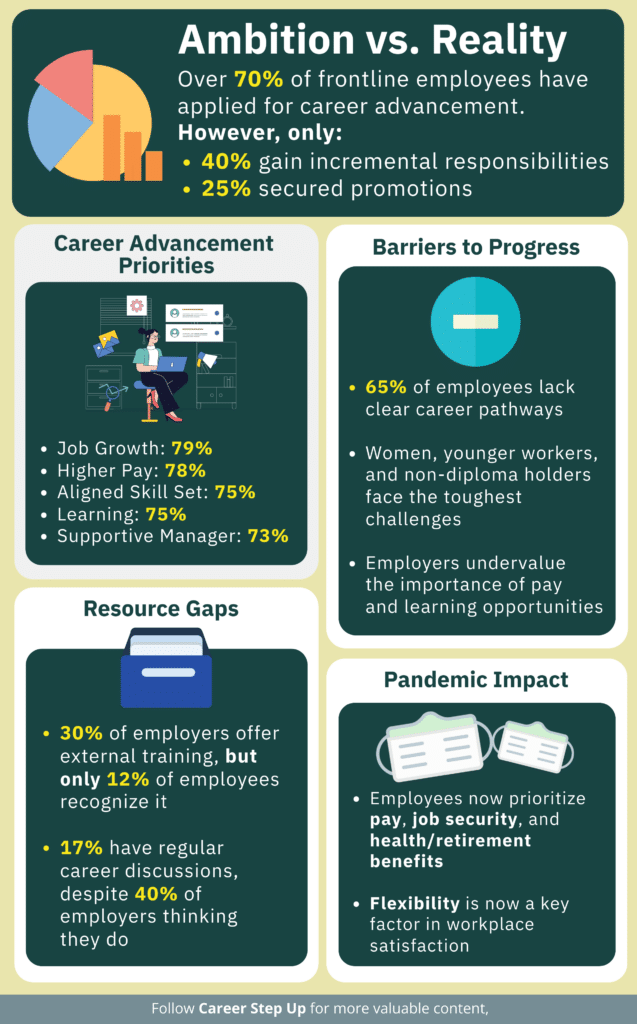For millions of frontline employees across industries like healthcare, retail, manufacturing, and customer service, career advancement is more than a dream—it’s a necessity. These are the workers earning $22 an hour or less, the backbone of businesses, striving for more responsibility, higher pay, and better opportunities.
But here’s the challenge: while over 70% of these employees are actively pursuing advancement, only a fraction—just 25%—secure promotions. What’s stopping them? And more importantly, what can they do to move forward?
The Ambition-Opportunity Disconnect
The desire to grow is clear. According to a recent McKinsey report created with Cara Plus, frontline workers have five clear priorities when it comes to career advancement:
- Job growth opportunities (79%)
- Higher pay (78%)
- Learning opportunities (75%)
- Skill alignment (75%)
- A supportive manager (73%)
Yet, these priorities often clash with a harsh reality: 65% of employees don’t see clear career pathways. Without a map, even the most driven workers can feel stuck.
Why Staying Comfortable Is Risky
For many, comfort zones feel like safety nets – but they can quickly turn into traps. It’s not enough to excel at routine tasks; employees need to challenge themselves to grow.
The McKinsey report also highlights systemic barriers that make this harder for some groups. Women, younger employees, and those without high school diplomas often face fewer opportunities and greater bias. Add in the disconnect between what employees want and what employers think they need, and it’s no wonder progress stalls.
The Pandemic Shift
COVID-19 reshaped the workplace in ways no one could have predicted. Pay, job security, and benefits like health insurance rose to the top of employee priorities. Flexibility became a dealbreaker for many, especially in roles that can adapt to hybrid or remote models.
For career-minded employees, these shifts highlight the need to not only meet workplace demands but also advocate for conditions that support their growth.
Strategies for Frontline Workers to Break Through
Advancing your career as a frontline employee isn’t easy, but it’s far from impossible. Here are five steps to take control of your growth:
- Seek ‘Stretch’ Assignments
Growth happens outside your comfort zone. Volunteer for projects that push your skills—whether it’s leading a team initiative, managing a budget, or exploring a new role entirely. - Ask for Feedback—and Act on It
One of the quickest ways to grow is by understanding where you can improve. Schedule regular check-ins with your manager to discuss your performance and career goals. Be specific: ask, “What’s one thing I can do better?” - Invest in Your Skills
Formal training isn’t always readily available, so take charge of your learning. Look for online courses, certifications, or mentorship opportunities that align with your career goals. - Expand Your Network
Your network is your net worth. Connect with colleagues outside your immediate team, attend company events, and participate in professional groups to open doors to new opportunities. - Embrace the Risk of Failure
Fear of failure often holds people back. Reframe it as a learning experience. Each misstep is a chance to refine your approach and demonstrate resilience—qualities employers value in leaders.
Your Career, Your Move
The biggest takeaway from the McKinsey report?
Career advancement isn’t just about waiting for opportunities; it’s about creating them. Employers have work to do in clarifying pathways, addressing biases, and offering better support. But as a frontline worker, you have the power to take control of your career.
Advancement is not about perfection—it’s about progress. With every new skill, connection, or challenge you take on, you’re building the momentum to break through barriers.
So, what’s your next move? It’s time to step up, stretch yourself, and start climbing. Your career is waiting.
Download the full report here.
Follow Career Step Up for advice, tips and regular career-changing newsletters.
Featured Image Credit: Shutterstock / Sirikarn Rinruesee.


